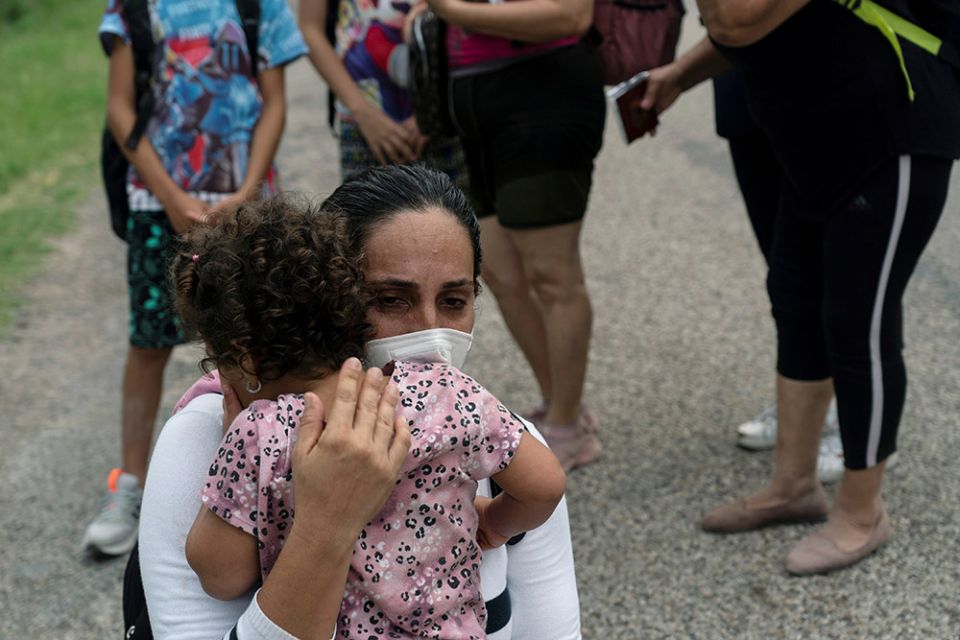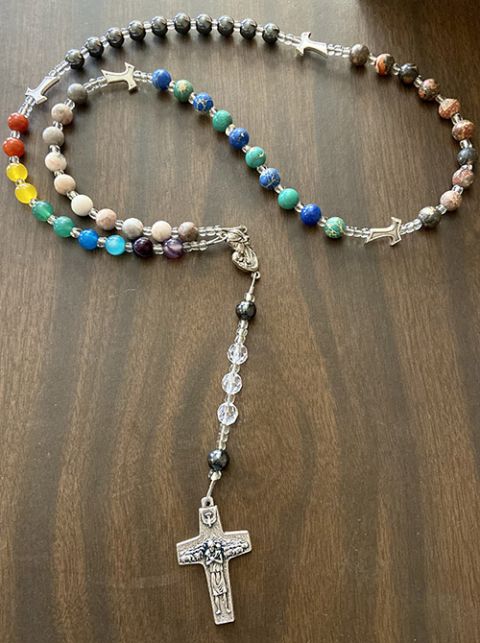20210607T1045-USA-IMMIGRATION -1249751 resize.jpg

Last summer, on the occasion of my perpetual vows, I was gifted with a modern rosary. Each decade, represented by different colors, invites me to pray with: mothers and children, migrants and refugees, those experiencing racism, those in need of clean water and/or hurt by natural disasters, and the LGBTQ+ community.
Lately, these beads call me to sit with the following questions: How do I touch reality? How does reality touch me?
As a law student, I find it scarily easy to stay removed from the systemic injustices that led me to law school in the first place. It's a lot easier for me to yell at a certain elected official on CNN as he wrongly explains Jackson's tripartite analysis and its relationship to vaccine mandates than it is for me — day in and day out — to continue the advocacy work needed to pass Build Back Better.
Perhaps, more importantly, it is our daily prayer that pulls us away from our positions of privilege and into relationship with reality.
IMG_8280 rosary CROP.jpg

As women religious, we have spent centuries touching the pain of the world as teachers, nurses, social workers, ministers, lawyers and advocates. We intimately know that injustices cannot be fixed solely by "Band-Aiding" the problem; whole institutions must be dismantled and rebuilt. This has always been and will always be the heartbeat of our ministry.
As women religious, I would venture to guess that each one of us reading this reflection could self-identify with at least one of these decades of the modern rosary. Maybe it is through ministry or life experiences. We are now being asked once again to touch these realities and learn from them as co-creators.
We might ask ourselves: Is signing a petition or donating money enough, or are we called to step outside our comfort zone and change the way we live?
How does the reality of women and children in our country and around the world touch us? In the U.S., do we really understand the need for paid family leave and fully-funded child care? How does the child tax credit lift families out of poverty and positively change generations? Do we know the status of affordable and safe housing in our communities? Are we too caught up in the pro-life vs. pro-choice debate that we overlook the systemic injustices such as sexual violence, poverty and lack of health care that force some women to make that excruciating decision?
In our passion for environmental justice and anti-fracking, do we think about the water crisis? Do we take the time to hear from the people who have not had clean drinking water for years? Or are we reminded of it only when it's mentioned on the evening news?
Are we willing to open our homes, our communities, and our institutions to migrants and refugees in a visible way? Do we truly understand what is happening at our U.S. southern border, with the racist policies of Title 42 and Migrant Protection Protocols, and with the Afghan refugee crisis? I think back to a friend's comment to me during Network's Title 42 vigil. Santiago said, "I think all people would be horrified if they saw what happened to us at the border and they would want to do everything they could to change it."
Advertisement
Advertisement
Are we afraid to touch the pain of racism in our own institutions because we cannot bear to look at our own complicity? How difficult is it for us to hear about racism in religious life, because we claim to not be racist since our ministries have always served minorities? On a personal and spiritual level, do we listen to our neighbors talk about systemic racism in our schools, our churches and our cities so that we can learn from them?
And, finally, how do we touch the lived reality of the LGBTQ+ community, especially in our church? We heard most recently about Pope Francis' letter to New Ways Ministry and Loretto Sr. Jeannine Gramick — even as bishops write scathing letters preventing LGBTQ+ people from receiving the Eucharist. I belong to a welcoming and inclusive parish, but I am also acutely aware that so many of our LGBTQ+ church family members have left for denominations that welcome them fully. Do we talk about this?
Do we, as women religious, touch the reality of these groups, or are we shielded from persecution because of our place of privilege? Are we open to the movement of the Spirit who calls us into relationship and communion with individuals from each of these groups?
May we claim our "membership" or "solidarity" in each decade, and let its Spirit call us to not just touch that reality, but live into it — bring it to the table, invite it to join us at community meetings, and risk being invited to join it publicly. Let us claim our identities, ask forgiveness for our wrongdoings and learn from others.
Like what you're reading? Sign up for GSR e-newsletters!


